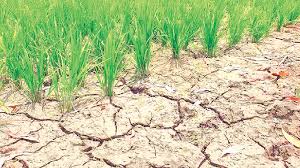The Nigerian Meteorological Agency (NiMet) has released its 2025 Seasonal Climate Prediction (SCP), warning of a late onset of rainfall across the country, extreme weather conditions, and potential flash floods in coastal cities.
The forecast was presented in Abuja by the Minister of Aviation and Aerospace, who emphasized the theme: “The Role of Early Warnings Towards a Climate-Resilient Aviation Industry for Sustainable Socio-Economic Development.” He highlighted the growing challenges of climate change in aviation and other critical sectors.
According to the minister, the annual SCP report provides essential information for decision-makers in agriculture, aviation, infrastructure, and disaster management. He urged Nigerians, particularly those in rain-dependent industries, to consult NiMet’s detailed predictions for accurate guidance on weather patterns.
The 2025 forecast predicts a delayed onset of rainfall in northern and central states, including Plateau, Kaduna, Niger, Benue, Nasarawa, Taraba, Adamawa, and Kwara. In contrast, an early onset is expected in the southern states of Delta, Bayelsa, Rivers, Anambra, Lagos, Ogun, Osun, Oyo, Ondo, Edo, Enugu, Imo, and Ebonyi, while other regions will experience normal rainfall patterns.
Read Also: NiMet embraces balanced scorecard system to drive performance
NiMet also forecasts an earlier-than-usual end to the rainy season in states like Zamfara, Katsina, Kano, Kaduna, Jigawa, Plateau, Bauchi, Borno, Yobe, Adamawa, Taraba, Niger, Kwara, Kogi, the FCT, Ekiti, and Ondo. However, a delayed end is expected in Lagos, Kwara, Taraba, Oyo, Ogun, Cross River, Delta, Akwa Ibom, Ebonyi, Anambra, and Enugu.
For 2025, the length of the rainy season is expected to be mostly normal across the country. However, Borno and Yobe may experience shorter-than-normal rainfall, while Lagos and Nasarawa could see longer-than-normal rainy periods. NiMet predicts normal to below-average annual rainfall for most areas, except for Kebbi, Kaduna, Ebonyi, Cross River, Lagos, Abia, Akwa Ibom, and the FCT, where above-normal rainfall is expected.
A major concern in the forecast is the likelihood of high-intensity rainfall in May and June, which may trigger flash floods in coastal cities. In addition, NiMet warns of a severe dry spell lasting over 15 days in Oyo State, affecting areas like Saki, Iseyin, Ogbomosho, and Atisbo, while moderate dry spells of up to 15 days are expected in Ekiti, Osun, Ondo, Ogun, Edo, Ebonyi, Anambra, Imo, Abia, Cross River, Delta, Bayelsa, and Akwa Ibom. Northern states could experience severe dry spells lasting up to 21 days between June and August 2025.
The August Break—a brief period of little or no rainfall—will likely begin in late July. Severe conditions are predicted in Lagos and Ogun, with 27 to 40 rain-free days, while Ogun, Oyo, and Ekiti states will experience moderate effects. Lighter effects are expected in Osun, Oyo, Kwara, and northern Ondo.
Temperature projections indicate a hotter-than-average year, with daytime and nighttime temperatures expected to rise above long-term averages, especially in January, February, March, and May 2025. However, April may bring slightly cooler temperatures, while northern states will likely experience intense heat.
NiMet stressed that the SCP aligns with the United Nations’ Early Warnings for All Initiative, serving as a crucial tool for government agencies, policymakers, and the public to prepare for weather-related hazards. The minister reaffirmed the Federal Government’s commitment to climate resilience and praised President Bola Tinubu’s leadership in supporting NiMet’s initiatives.
In his remarks, NiMet’s Director General, Prof. Charles Anosike, thanked key government officials for their support, including the Chairmen of the Senate and House Committees on Aviation. He emphasized the importance of collaboration in ensuring that the SCP reaches all communities, especially those vulnerable to extreme weather.
To enhance accessibility, NiMet has made the 2025 SCP available in four languages—Hausa, Igbo, Yoruba, and Pidgin English—ensuring that critical climate information reaches all Nigerians.






